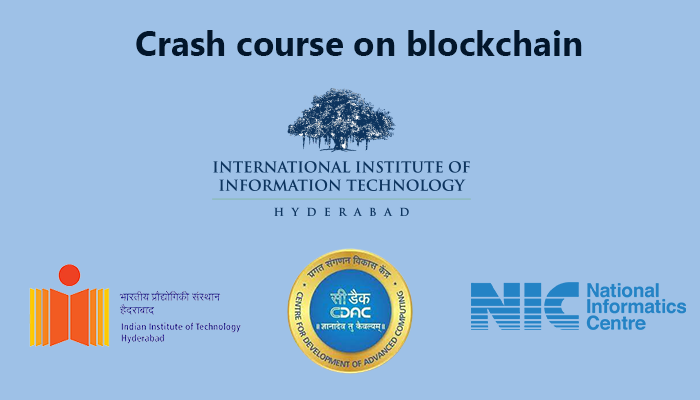A crash course on blockchain was jointly conducted by IIITH, IITH, Centre for Development of Advanced Computing (CDAC) and National Informatics Centre (NIC) from 7 August to 4 September. Here is a brief background to how this course took off:
In 2008, Satoshi Nakamoto (pseudonym; real identity unknown till date) introduced a new digital, decentralized, anonymous, secure currency — bitcoin in a white paper. The paper proposed a blockchain — a ledger or a database of all the transactions for enabling bitcoin. A blockchain organizes data as an ordered collection of blocks with a link connecting two consecutive blocks. The link is based on cryptographic operations and is not easy to break once formed. In a blockchain system, all interested computers store the relevant database — the chain of blocks. These computers synchronize over the Internet. Hosted by a large number of computers simultaneously, its data is accessible to anyone on the Internet. No centralized version of this information exists for a hacker to corrupt. Thus, the records that a blockchain maintains are genuinely public, can be trusted as millions of copies validate and are easily verifiable.
Blockchain technology can not only record transactions but also record virtually everything of value. Blockchain offers better trust and transparency in the database. It is going to transform the way we store and use data. That realization has lately flourished into a plethora of startups, government initiatives, corporate alliances, and research projects.
In the last decade, blockchain — a distributed ledger technology, gained much attention due to its use across various domains in a gamut of applications. With this, MEITY has set up a project to build a Unified Blockchain Framework (UBF) involving multiple organizations, each offering its expertise. UBF is a visionary project to build geographically distributed blockchain infrastructure in India. It aims to offer a technology stack with open APIs that anybody can leverage to build nationwide blockchain applications. UBF offers interoperability with multiple blockchain technologies, better security, and improved smart-contract performance. MEITY and the Project Investigators felt that a small training module for new and young project personnel could positively impact their readiness to contribute to the project.
Prof. Kishore Kothapalli, Dr. Sujit Gujar, and Dr. Sathya Peri, IIT Hyderabad decided to conduct a small training program. The team designed the course as an excellent blend of foundational concepts with hands-on and use case illustrations. Dr. B K Murthy from MEITY inaugurated the training program. A total of 83 young and experienced professionals and students across different institutions participated online in the course.
The course started with Dr. Sujit Prakash Gujar explaining the foundations of the blockchain and Dr. Ankit Gangwal teaching the basics of cryptography. Dr. Sathya Peri and Prof Kishore Kothapalli covered distributed consensus. The practitioners from NIC and CDAC demonstrated blockchain technology through hands-on experience in hyper-ledger and illustrations of some use-cases.

